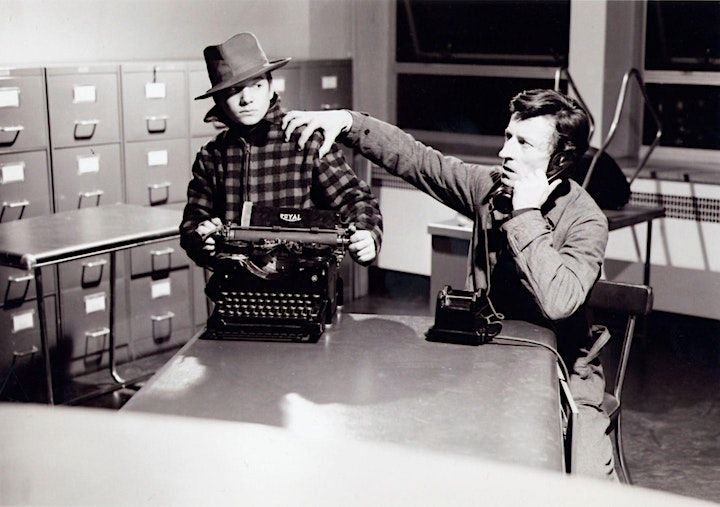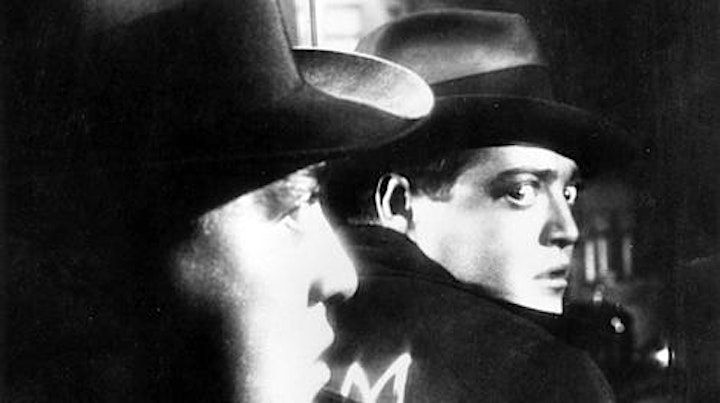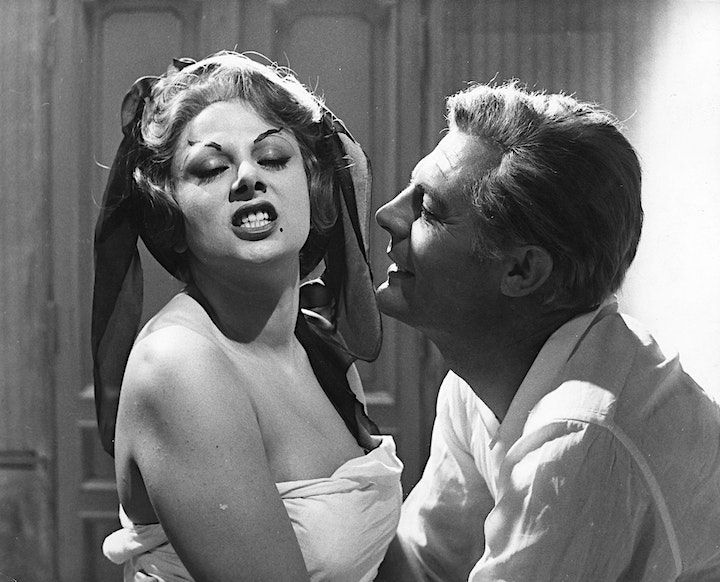Masters of European Cinema: A Series of Film Screenings
Schedule
Thu Jun 01 2023 at 06:30 pm to 09:30 pm
Location
University of Liverpool | Liverpool, EN

About this Event
From the Lumière brothers on 28 December 1895 to the most avant-garde European film movements including German Expressionism, Italian neorealism, French New Wave, Polish Film School, New German Cinema, Portuguese Cinema Novo, Movida Madrileña, Czechoslovak New Wave, Dogme 95, New French Extremity, and Romanian New Wave. This year we will present a selection of six European films on 1st, 2nd, 8th, 9th, 15th and 16th of June at the University of Liverpool.
Schedule & Details of Screenings
01/06/2023: French Film "400 Blows" directed by François Truffaut
Overview: 400 Blows (French: Les Quatre Cents Coups) is a 1959 French coming-of-age drama film. The most autobiographical of Truffaut's films, 400 Blows follows a few months in the life of 12-year-old Antoine Doinel (Jean-Pierre Léaud) who, misunderstood and mistreated by his neglectful parents and repressive schoolteachers, seeks refuge in truancy, petty crime, and the cinema. The film’s French title actually means ‘raising hell’, and Antoine’s rebellion against rigid social norms, breaking out from the confinement of stifling classrooms or his parents’ cramped flat, is exhilaratingly captured in Henri Decaë’s lyrical location shooting on the streets of Paris.
Trivia:
- All the young actors who unsuccessfully auditioned for the role of Antoine were used in the classroom scenes.
- Ranked number 8 non-English-speaking film in the critics' poll conducted by the BBC in 2018.
- François Truffaut discovered Jean-Pierre Léaud after placing an ad in Paris Soir. The two would continue working together for the next 20 years.
"A small masterpiece from France" - The New York Times.
“One of the most esteemed classic films of the New French Wave” – MTV News
02/06/2023: German Film "M" directed by Fritz Lang
Overview: M is a 1931 German mystery suspense thriller, made two years before Hitler came to power. M, which stands for M**der of ‘Mörder’, was Fritz Lang's first sound film and is a great psychological thriller, a trenchant treatise on crime and justice, and a vivid portrait of the rapidly disintegrating Weimar Republic. Peter Lorre shot to stardom as the compulsive child murderer who is hunted down not only by a desperate, frustrated police force, but - rather more ruthlessly - by Berlin's criminal underworld. The extraordinarily detailed police procedures are based on Lang's research at the Alexanderplatz police headquarters, while the documentary-style depiction of Berlin's prostitutes, beggars and grotesquely respectable citizens recalls the sharp-eyed satire of artists such as Grosz and Dix. Lorre's first major screen role was also his greatest - no monstrous caricature but a quietly credible psychopath who could easily be your next-door neighbour. The explosive revelation of his inner torment is one of cinema's great set pieces.
Trivia:
- The film premiered in 1931. Adolf Hitler and his Nazi party took power in 1933 and banned it the next year. It was then stored in a vault, where it stayed for many years. German audiences didn't get the chance to see it again until 1966. For its video release 30 years later, it underwent a restoration that included the addition of music and sound effects that wouldn't have been authorized by Fritz Lang (he deliberately kept certain passages quiet) and the cutting of certain scenes.
- Fritz Lang's cruelty to the actors was legendary. Peter Lorre was thrown down the stairs into the cellar over a dozen times. When Lang wanted to hire Lorre for Human Desire (1954) over two decades later, the actor refused.
“Fritz Lang’s super thriller fascinates” The Guardian
"M is a fantastic film and one of the finest of the early sound era" - Philosophy in Film
08/06/2023: Italian Film "8 ½ " directed by Federico Fellini
Overview: 8 ½ (Italian title: Otto e mezzo) is a 1963 surrealist comedy-drama film directed by Federico Fellini. Struggling to find inspiration for his next project, acclaimed director Guido Anselmi (Marcello Mastroianni) wrestles with his dreams, memories and desires in his search for creativity. Blending visions with reality, Fellini’s exquisitely shot 8½ - now restored by Gaumont and Éclair – offers a unique portrayal of a restless creative talent battling with his past and the distractions of the present, as he fights to determine his future artistic voice. Elaborate and self-reflexive, 8½ is an impeccable example of Fellini's unique style, a bravura and extravagance that has influenced countless generations of filmmakers – from Woody Allen to Wes Anderson. No. 4 in Sight & Sound’s Directors’ Poll of greatest films of all time (No. 10 in Critics’ Poll), 8½ is an undisputed classic of world cinema awaiting discovery by a new generation of cinemagoers.
Trivia:
- During the rehearsal scene, the love theme from The Godfather can be heard on the piano. The music for 8 1/2 was composed by Nino Rota, who composed the music for The Godfather - among numerous other films.
- 8½ was shot, like almost all Italian movies at the time, completely without sound recording on set. All dialogue was dubbed during post production. Fellini was known for shouting direction at his actors during shooting, and for rewriting dialogue afterwards, making a lot of the dialogue in the movie appear out-of-sync.
"8 ½ is one of the classic films about the art of cinema. There is something about the make-believe of movies, and our buying into the dreams they foster, which suggests reflection and self-referencing, as if films offered a mirror to our inner lives and the stories we tell on the big screen. " - The Arts Desk
"A masterpiece by cinema's ultimate dreamer" The Guardian
09/06/2023 : Polish Film "Camera Buff" directed by Krzysztof Kieslowski
Overview: Camera Buff (Polish: Amator, meaning "amateur") is a 1979 Polish drama film written and directed by Krzysztof Kieślowski and starring Jerzy Stuhr. An ordinary factory worker buys a camera on the occasion of the birth of his child. The authorities order him to make documentaries about the factory's success. But his endeavour to be truthful leads him to opposition against censorship.
Trivia:
- The film's opening scene and Irka's nightmare about a hawk killing a chicken are reminiscent of Ken Loach's Kes (1969) - a film about a boy who takes to training a wild kestrel in order to escape his troubled life. Later, Filip can be seen reading a filmmaking text and turning to a section about Ken Loach and Kes (1969). This reference is twofold. First, Filip is clearly inspired by filmmakers like Loach in making social realist films about working-class people. Second, Irka is tormented by images mirroring Kes (1969) which represent her husband's budding obsession with this type of filmmaking.
''Camera Buff manifests a strong sense of self-importance. It seems to share Filip's conviction that there is something magical about the camera itself, sometimes confusing the importance of the object photographed with the camera that does the photographing." - The New York Times
"Camera Buff is the film that gave Kieslowski major international attention and marks a major artistic shift in his work" - Senses of Cinema
15/06/2023: Czech Film "The Firemen's Ball" directed by Miloš Forman
Overview: The Firemen's Ball (Czech: Hoří, má panenko - "Fire, my lady") is a 1967 comedy film directed by Miloš Forman. The volunteer fire department in a small town is having a big party when the ex-boss of the department celebrates his 86th birthday. The whole town is invited but things don't go as planned. Someone is stealing the prizes to the lottery and the candidates for the Miss Fire-Department beauty contest are neither willing nor particularly beautiful.
Trivia:
- In spite of many claims the film was banned in Czechoslovakia by the communists in power at the time, it was not. It actually sold over 750,000 tickets in the country and was shown on state-controlled television in 1969.
- Few professional actors were used for this picture. Many were residents of the small town of Vrchlabi, Czech Republic where the film was shot, including many of the actual volunteer firemen of the town.
"With Loves of a Blonde, it's the best work Forman's done, rooted in a social reality that has eluded him in his American projects." - Chicago Reader
"Miloš Forman’s last Czech film, The Firemen’s Ball, starts as a light-hearted farce. By the time the film reaches its masterful third act, it has become a tragicomedy of tremendous allegorical power." - Kafkadesk
16/06/2023: Swedish Film "Songs from the Second Floor"
Overview: Songs from the Second Floor (Swedish: Sånger från andra våningen) is a Swedish black comedy-drama film, written and directed by Roy Andersson. A film poem inspired by the Peruvian poet César Vallejo. We meet people in the city. People trying to communicate, searching compassion and get the connection of small and large things.
Trivia:
- Each scene is shot with one take where the camera stands still as the actors embrace the frame (the camera moves once in the entire film, in the railway station scene).
- The quotations used as a recurring motif are from the work of Peruvian poet César Vallejo: "Traspié entre dos estrellas" ("Stumble Between Two Stars").
"Roy Andersson presents us with loosely connected scenes from the end of the world, in a series of bizarre tableaux unfolding in weirdly lucid dream-landscapes of vast plains, endless corridors and vertiginous perspective lines - each scene filmed in one long take from a static camera" - The Guardian
"Songs From the Second Floor is a parade of fools marching blindly to their ruin, and for the moment we are still spectators and have not been required to join the march. The laughter inspired by the movie is sometimes at the absurd, sometimes simply from relief." - Roger Ebert



Where is it happening?
University of Liverpool, 502 Teaching Hub - Teaching Room 4, Liverpool, United KingdomEvent Location & Nearby Stays:
GBP 3.00
